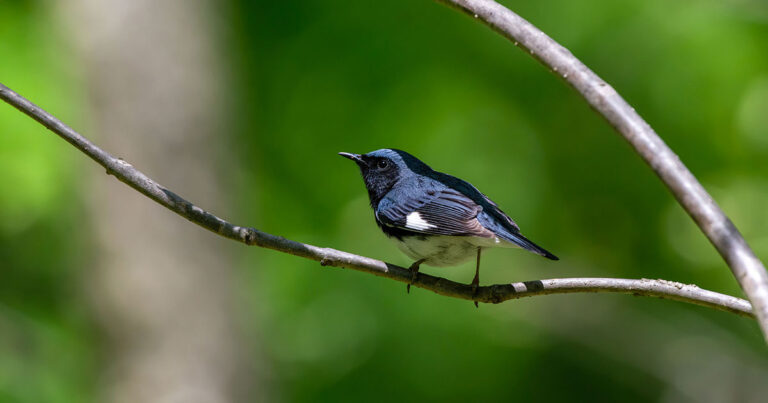For migrating birds, timing is essential. Their journeys require large quantities of vitality, so that they want loads of gas on their approach, and after they get to their breeding grounds, they’ll have hungry chicks to feed, too. “Day by day throughout migration, they’re simply on this trade-off between ravenous to demise and having the ability to proceed ahead,” says Morgan Tingley, an ornithologist at UCLA. “Once they’re not flying, they’re principally voraciously consuming.”
These vacationers depend on the newly-available sources introduced by spring, comparable to leaves, flowers, and the bugs that come out to munch on them. However that abundance of sources dies down later within the season—and if birds arrive at a stopover or breeding web site after this peak interval of “spring green-up,” they may miss out on the feeding frenzy.
Local weather change is elevating the danger of this type of timing mismatch. As temperature and precipitation patterns shift, and spring’s “green-up” arrives earlier and earlier, a serious query for scientists has been: Can birds sustain by altering their migrations? In line with a sweeping study published this week within the journal PNAS, a variety of species could already be falling behind.
“We’re used to eager about warming with local weather change,” says examine creator Scott Loss, an ecologist at Oklahoma State College. “However we’re altering the seasons, the seasonality, all throughout Earth.” Simply this 12 months, following a gentle winter and record-warm February, leaves and blooms are already coming out, in some instances weeks ahead of their standard schedules; components of the West Coast are seeing a few of their earliest spring leaf-outs on report.
The brand new examine reveals this isn’t an anomaly. Loss and his staff analyzed the migratory routes of 150 chicken species, from hawks to hummingbirds, that breed in North America. They discovered that spring green-up was certainly transferring earlier throughout birds’ flight paths, in keeping with satellite tv for pc observations between 2002 and 2021.
They then stacked these spring shifts in opposition to birders’ observations compiled from eBird, and located that migrators typically weren’t maintaining tempo: “Most of those species have been extra in sync with previous long-term averages of green-up than with present green-up,” says creator Ellen Robertson, who labored on the examine as a postdoctoral researcher at Oklahoma State College. It’s a regarding mismatch, she says, because it suggests sure birds might not be versatile sufficient to adapt to a quickly altering local weather. Reasonably than deciding when to journey based mostly on present circumstances, some species could have migratory habits that’s hard-wired into their genes or discovered from different birds—components that might take generations to shift.
These findings add to a growing body of evidence suggesting spring migration is falling out of sync with meals sources, says Stephen Mayor, an ecologist on the Ontario Forest Analysis Institute who was not concerned with the examine. “This paper expands on earlier work to point out that the phenomenon is just not distinctive to songbirds, however is widespread throughout chicken teams,” Mayor says in an e-mail. The evaluation lined the whole lot from geese and geese to kites and woodpeckers.
Longer-distance migrants—comparable to vireos and warblers that winter in Central or South America—appeared to have additional bother adjusting.
Whereas the sample of mismatch confirmed up throughout the board, longer-distance migrants—comparable to vireos and warblers that winter in Central or South America—appeared to have additional bother adjusting to year-to-year adjustments. Their schedules seemed to be extra tied to the calendar, presumably counting on cues like altering daylight to inform them when to set off, Loss says.
Tingley, who was not concerned with this new examine, has seen related patterns in his research: “Most birds can’t sustain properly, however there’s an actual vary,” he says. Brief-distance migrants like Jap Phoebes can extra carefully monitor circumstances on the bottom, which might assist them adapt when these circumstances change. However “if you happen to’re a chicken that’s wintering in South America, you haven’t any understanding, no means to know whether or not or not it’s an early spring or late spring right here in North America,” Tingley says. “These are the birds which are actually falling behind.”
If migrants can’t discover sufficient sources of meals, they might not have the ability to survive their journeys, or might produce fewer offspring after they arrive, Loss says. And these earlier springs are a part of a broader set of challenges for birds and different migratory animals, Robertson factors out, starting from sea turtles to wildebeest. A recent United Nations report discovered that one out of each 5 migratory species they tracked was susceptible to extinction, battered by threats like habitat loss and overhunting, in addition to different dangers introduced by local weather change.
Nonetheless, extra analysis is required to know precisely how shifting seasonal schedules are affecting chicken survival. “The implications for chicken populations are probably catastrophic, but additionally not but fully clear,” Mayor provides.
There’s hope, for instance, that even when they’ll’t shift their migrations, birds can adapt in different methods, like by shortening the window of preparation earlier than they lay eggs—which some species are already doing, Tingley factors out. Chicks specifically have to eat plenty of bugs, so it’s essential that their hatches line up with intervals of bug abundance. “They’re advancing their breeding, even after they can not advance their migration,” he says, however it’s not recognized to what extent these sorts of adjustments could make up for misplaced time.
“It might be that even by attempting in all these other ways to adapt to local weather change, it’s nonetheless not sufficient,” Tingley says. “And at what level that turns into actually, actually unhealthy for populations is a very huge remaining query.”

